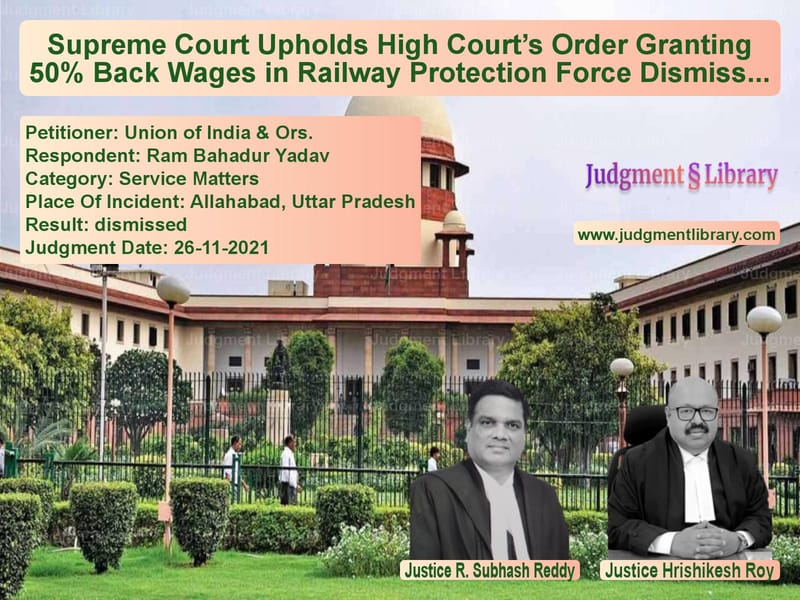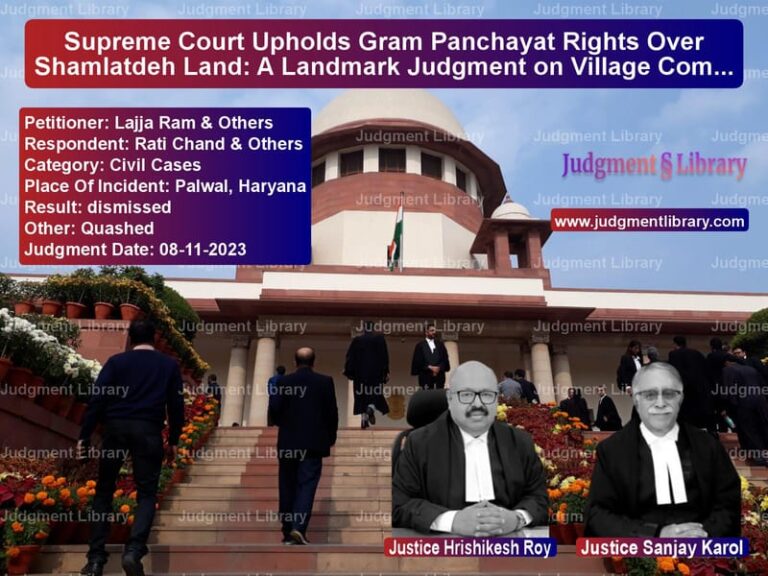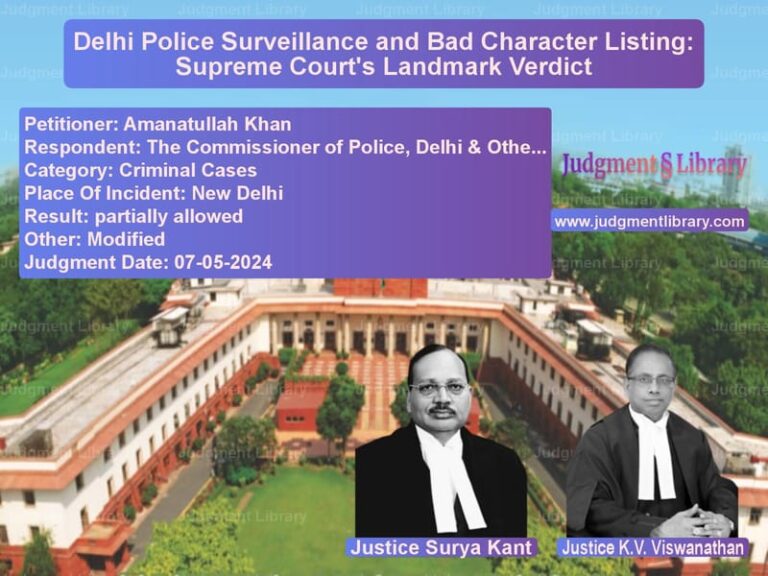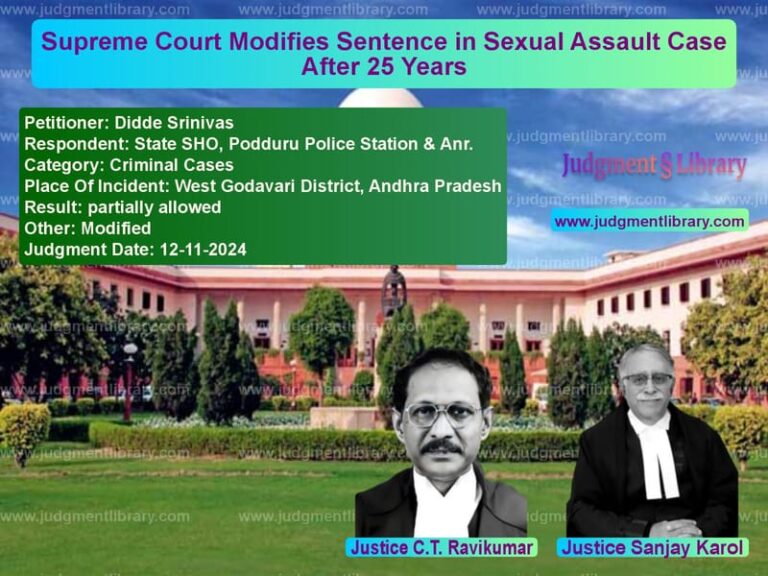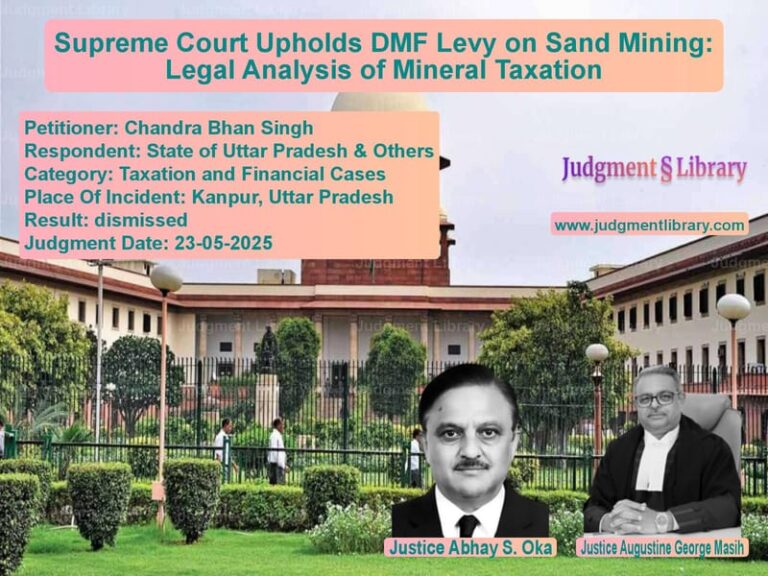Supreme Court Upholds High Court’s Order Granting 50% Back Wages in Railway Protection Force Dismissal Case
The case of Union of India & Ors. v. Ram Bahadur Yadav revolves around the dismissal of a Railway Protection Force (RPF) Head Constable accused of colluding in the theft of Non-Judicial Stamp Papers worth more than Rs.1 crore. The Supreme Court upheld the Allahabad High Court’s decision to reinstate him with pensionary benefits and awarded him 50% back wages, ruling that the dismissal without proper inquiry was unjust.
The Court emphasized the importance of conducting a fair inquiry before dismissing an employee and held that the invocation of Rule 161 of the RPF Rules, 1987, which allows dismissal without an inquiry, was improper in this case.
Background of the Case
Ram Bahadur Yadav, a Head Constable in the Railway Protection Force, was accused of colluding with another constable in the theft of Non-Judicial Stamp Papers. On October 22, 1998, he was dismissed from service under Rule 161 of the RPF Rules, which allows dismissal without an inquiry if it is deemed impracticable to hold one.
The dismissal order cited his alleged involvement in the theft but did not record specific reasons for dispensing with an inquiry. His appeal and revision petitions were rejected, leading him to challenge the dismissal before the Allahabad High Court.
The High Court ruled in his favor, setting aside the dismissal and awarding him pensionary benefits along with 50% back wages, as he had attained superannuation.
Arguments by the Petitioner
The Union of India and the Railway Protection Force contended:
- Rule 161 of the RPF Rules empowers authorities to dismiss an employee without an inquiry if it is not reasonably practicable to hold one.
- Witnesses had been threatened and were unwilling to testify, justifying the invocation of Rule 161.
- Even if the dismissal order did not explicitly state reasons, the case file contained sufficient justification for the decision.
- The High Court erred in granting 50% back wages despite the serious allegations against the respondent.
Arguments by the Respondent
Ram Bahadur Yadav, represented by Senior Counsel, countered:
- Rule 161 mandates that reasons for dispensing with an inquiry must be recorded in writing, which was not done in this case.
- The allegations against him were vague and did not justify the extreme measure of dismissal without inquiry.
- The standard disciplinary process under RPF Rules 132, 148, and 153 should have been followed.
- There was no police complaint filed against him, which cast doubt on the credibility of the allegations.
- The High Court’s order was justified as he was denied the opportunity to defend himself.
Supreme Court’s Judgment
The Supreme Court, comprising Justices R. Subhash Reddy and Hrishikesh Roy, ruled in favor of the respondent, stating:
“Rule 161 of the RPF Rules itself mandates recording of reasons. The normal rule for conducting an inquiry is governed by Rules 132, 148, and 153 of the RPF Rules. If the authorities invoke a special procedure, unless they record reasons, as contemplated in the Rule itself, no order could have been passed by invoking Rule 161.”
The Court held that:
- The dismissal order did not contain any specific reasons for dispensing with an inquiry.
- The claim that witnesses were threatened was not substantiated with evidence.
- The dismissal of a government employee is a severe action and must follow proper procedural safeguards.
- There was no compelling reason to invoke Rule 161 when a regular inquiry could have been conducted.
The Court cited the case of Jaswant Singh v. State of Punjab, where it was held that summary dismissal without justification violated principles of natural justice.
Regarding Back Wages
On the issue of back wages, the Supreme Court ruled:
“The respondent was not given any opportunity to defend his case at all. It is clearly well settled that any amount of suspicion cannot be equated to proof. Keeping in mind the ratio in the judgment of this Court in Deepali Gundu Surwase, we are of the considered opinion that grant of 50% of back wages is just and fair in the facts and circumstances of the case.”
The Court emphasized that since the respondent had already retired, reinstatement was not an option. However, it upheld the High Court’s decision to award him 50% back wages as a fair remedy.
Conclusion
This ruling underscores the importance of procedural fairness in disciplinary actions against government employees. The judgment ensures that authorities cannot bypass inquiry requirements without strong justification and that employees dismissed unfairly are entitled to appropriate compensation.
Petitioner Name: Union of India & Ors..Respondent Name: Ram Bahadur Yadav.Judgment By: Justice R. Subhash Reddy, Justice Hrishikesh Roy.Place Of Incident: Allahabad, Uttar Pradesh.Judgment Date: 26-11-2021.
Don’t miss out on the full details! Download the complete judgment in PDF format below and gain valuable insights instantly!
Download Judgment: union-of-india-&-ors-vs-ram-bahadur-yadav-supreme-court-of-india-judgment-dated-26-11-2021.pdf
Directly Download Judgment: Directly download this Judgment
See all petitions in Employment Disputes
See all petitions in Disciplinary Proceedings
See all petitions in Pension and Gratuity
See all petitions in Judgment by R. Subhash Reddy
See all petitions in Judgment by Hrishikesh Roy
See all petitions in dismissed
See all petitions in supreme court of India judgments November 2021
See all petitions in 2021 judgments
See all posts in Service Matters Category
See all allowed petitions in Service Matters Category
See all Dismissed petitions in Service Matters Category
See all partially allowed petitions in Service Matters Category

